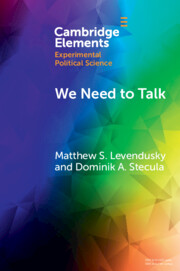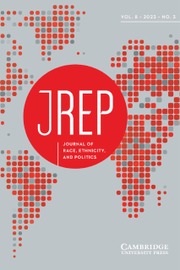Examining Motivations in Interpersonal Communication Experiments
Part of Elements in Experimental Political Science
- Authors:
- Elizabeth C. Connors, University of South Carolina
- Matthew T. Pietryka, Florida State University
- John Barry Ryan, Stony Brook University, State University of New York
- Date Published: November 2022
- availability: Available
- format: Paperback
- isbn: 9781009114288
Paperback
Other available formats:
eBook
Looking for an examination copy?
This title is not currently available for examination. However, if you are interested in the title for your course we can consider offering an examination copy. To register your interest please contact [email protected] providing details of the course you are teaching.
-
Does interpersonal political communication improve the quality of individual decision making? While deliberative theorists offer reasons for hope, experimental researchers have demonstrated that biased messages can travel via interpersonal social networks. We argue that the value of interpersonal political communication depends on the motivations of the people involved, which can be shifted by different contexts. Using small-group experiments that randomly assign participants' motivations to seek or share information with others as well as their motivations for evaluating the information they receive, we demonstrate the importance of accounting for motivations in communication. We find that when individuals with more extreme preferences are motivated to acquire and share information, collective civic capacity is diminished. But if we can stimulate the exchange of information among individuals with stronger prosocial motivations, such communication can enhance collective civic capacity. We also provide advice for other researchers about conducting similar group-based experiments to study political communication.
Customer reviews
Not yet reviewed
Be the first to review
Review was not posted due to profanity
×Product details
- Date Published: November 2022
- format: Paperback
- isbn: 9781009114288
- length: 75 pages
- dimensions: 228 x 152 x 6 mm
- weight: 0.14kg
- availability: Available
Table of Contents
1. Introduction
2. Our Experimental Framework
3. Motivating Information Seeking and Sharing
4. Motivating Prosociality
5. Advice on Experimental Design.-
General Resources
Find resources associated with this title
Type Name Unlocked * Format Size Showing of
This title is supported by one or more locked resources. Access to locked resources is granted exclusively by Cambridge University Press to instructors whose faculty status has been verified. To gain access to locked resources, instructors should sign in to or register for a Cambridge user account.
Please use locked resources responsibly and exercise your professional discretion when choosing how you share these materials with your students. Other instructors may wish to use locked resources for assessment purposes and their usefulness is undermined when the source files (for example, solution manuals or test banks) are shared online or via social networks.
Supplementary resources are subject to copyright. Instructors are permitted to view, print or download these resources for use in their teaching, but may not change them or use them for commercial gain.
If you are having problems accessing these resources please contact [email protected].
Sorry, this resource is locked
Please register or sign in to request access. If you are having problems accessing these resources please email [email protected]
Register Sign in» Proceed
You are now leaving the Cambridge University Press website. Your eBook purchase and download will be completed by our partner www.ebooks.com. Please see the permission section of the www.ebooks.com catalogue page for details of the print & copy limits on our eBooks.
Continue ×Are you sure you want to delete your account?
This cannot be undone.
Thank you for your feedback which will help us improve our service.
If you requested a response, we will make sure to get back to you shortly.
×












